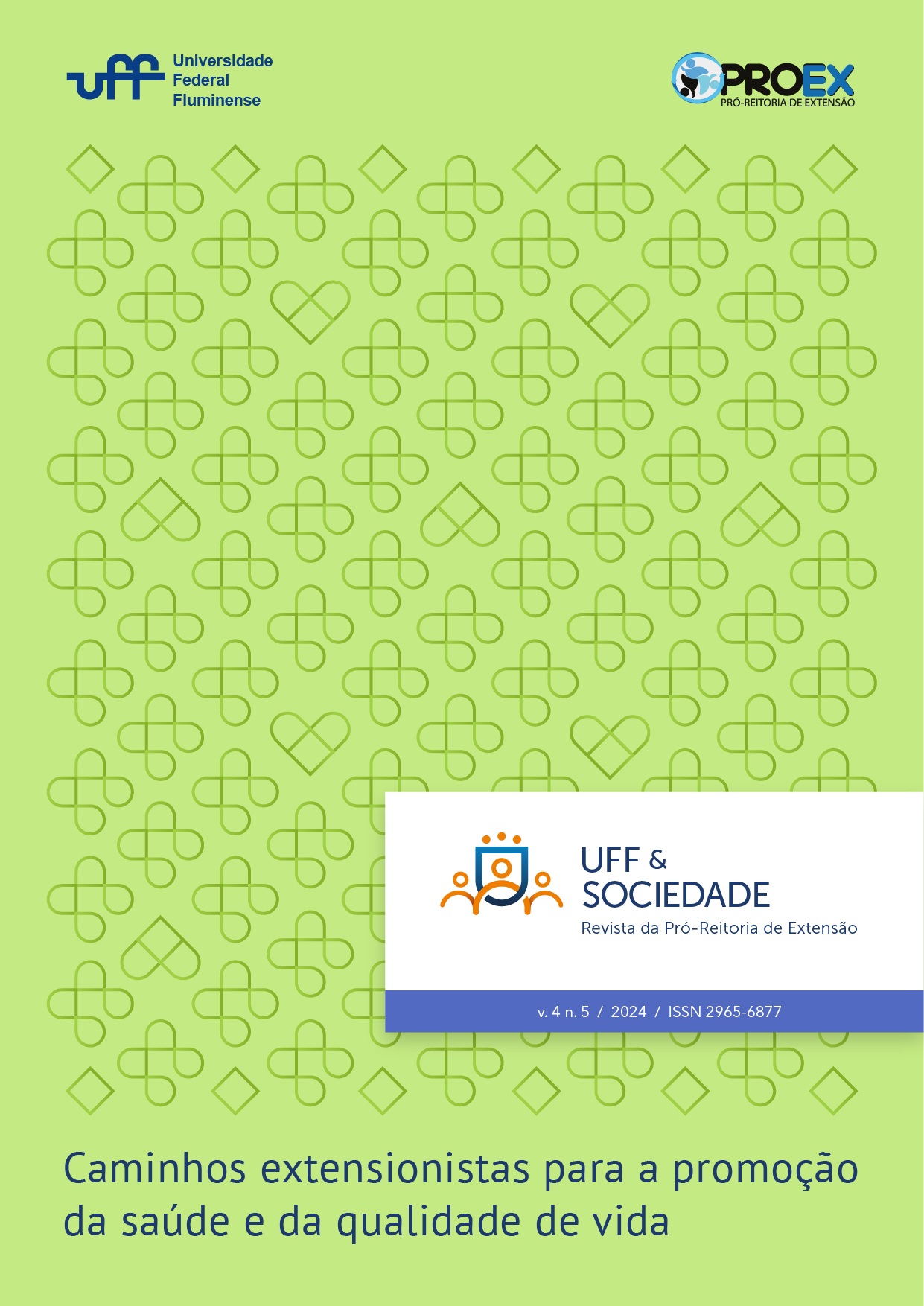Biodiversidade vegetal promovendo a segurança alimentar
a experiência do Programa PANC UFF na difusão das Plantas Alimentícias Não Convencionais
Palavras-chave:
Sustentabilidade, Educação, Saúde, Metodologias participativasResumo
O programa de extensão Conhecendo Outras Plantas Alimentícias - PANC UFF promove o uso das Plantas Alimentícias Não Convencionais (PANC) como ferramenta para a segurança alimentar e a promoção da saúde para a comunidade em geral. Ao integrar saberes acadêmicos e populares, o programa atua no fortalecimento de práticas alimentares sustentáveis, com enfoque na biodiversidade e autonomia alimentar. Alinhado aos Objetivos de Desenvolvimento Sustentável (ODS), em especial os ODS 2 (Fome Zero) e 3 (Saúde e Bem-estar), o projeto de¬senvolve atividades educativas que exploram as potencialidades das PANC na me¬lhoria da qualidade de vida. Por meio de oficinas, jogos didáticos e tecnologias, o PANC-UFF promove uma educação inovadora, que aproxima as comunidades da academia, permitindo o diálogo e o resgate de saberes tradicionais. Essa integra¬ção fortalece a extensão como um espaço de promoção de saúde e bem-estar, ao mesmo tempo em que contribui para a conscientização sobre o impacto positivo de uma alimentação diversificada, nutritiva e ecológica. As práticas extensionistas desenvolvidas enfrentam desafios como a resistência cultural e a falta de conhe¬cimento sobre as PANC, mas buscam superá-los através de metodologias partici¬pativas e inclusivas. Assim, o programa oferece uma abordagem inovadora para a promoção da saúde, fomentando a troca de saberes entre universidade e socieda-de, além de promover o desenvolvimento de políticas públicas que incentivem o uso sustentável das PANC e a preservação da biodiversidade.
Referências
BOSCOLO, Odara Horta. Estudos etnobotânicos em área de Mata Atlântica, nas Comunidades de Galdinópolis e Rio Bonito, Nova Friburgo, Rio de Janeiro, Brasil. 2011. 512f. Tese (Doutorado em Biologia Vegetal) - Universidade Federal do Rio de Janeiro, Rio de Janeiro, 2011.
FELIPPE, Gil. Entre o jardim e a horta: as flores que vão para a mesa. São Paulo: Senac, 2003.
JACOB, Michelle Cristine Medeiros; ALBUQUERQUE, Ulysses Paulino. Biodiverse food plants: Which gaps do we need to address to promote sustainable diets? Ethnobiology and Conservation, [S. l.], v. 9, n. 30, p. 1-6, 2020. Disponível em: https://ethnobioconservation.com/index.php/ebc/article/view/371. Acesso em: 5 nov. 2024.
KELEN, Marília Elisa Becker et al. (Orgs.). Plantas alimentícias não convencionais (PANCs): hortaliças espontâneas e nativas. Porto Alegre: UFRGS, 2015. Disponível em: https://www.ufrgs.br/viveiroscomunitarios/wp-content/uploads/2015/11/Cartilha-15.11-online.pdf. Acesso em: 5 nov. 2024.
KNUPP, Valdely; LORENZI, Henry. Plantas alimentícias não convencionais (PANC) no Brasil. São Paulo: Instituto Plantarum de Estudos da Flora, 2014.
MELO, Roseli Freire de; VOLTOLINI, Tadeu Vinhas (Ed.). Agricultura familiar dependente de chuva no Semiárido. Brasília: Embrapa, 2019. Disponível em: https://ainfo.cnptia.embrapa.br/digital/bitstream/item/204569/1/Agricultura-familiar-dependente-de-chuva-no-semiarido-2019.pdf. Acesso em: 5 nov. 2024.
ONU. Organização das Nações Unidas no Brasil. Documentos Temáticos: Objetivos de Desenvolvimento Sustentável. Brasília: ONUBR, 2017. Disponível em: http://www.br.undp.org/content/dam/brazil/docs/publicacoes/documentos-tematicos-ods-07-2017.pdf. Acesso em: 11 mar. 2024.
POULAIN, Jean-Pierre. Sociologias da alimentação: os comedores e o espaço social alimentar. Tradução de Rossana Pacheco da Costa Proença, Carmen Sílvia Rial e Jaimir Conte. 2ª ed., Florianópolis: Editora da UFSC, 2013.
SILVA, Maria do Socorro; VASCONCELOS, Simão Dias. Extensão universitária e formação profissional: avaliação da experiência das Ciências Biológicas na Universidade Federal de Pernambuco. Estudos em Avaliação Educacional, [S. l.], v. 17, n. 33, p. 119-135, 2006. Disponível em: http://www.fcc.org.br/pesquisa/publicacoes/eae/arquivos/1280/1280.pdf. Acesso em: 2 set. 2024.














